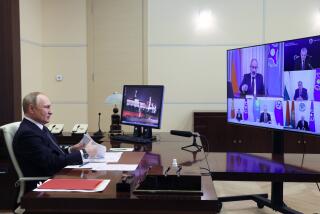Islands Dispute Stalls Better Soviet-Japanese Relations
- Share via
MOSCOW — After five days of high-level negotiations, the Soviet Union and Japan were deadlocked Friday over a territorial dispute, blocking attempts to sign a peace treaty officially ending World War II and dashing President Mikhail S. Gorbachev’s hopes of visiting Japan anytime soon.
At issue are the Kurile Islands, taken over by the Soviet Union after the war. The southernmost four islands in the chain are “territories of Japan, both traditionally and legally,” Japanese Foreign Minister Sosuke Uno said at a news conference at the end of his visit, which concluded with a private session with Gorbachev.
“Those islands are entirely Russian,” Soviet Deputy Foreign Minister Igor A. Rogachev countered at a separate news conference.
The disagreement has prompted the Japanese to decline to set a date for a Gorbachev visit, making it the only major industrialized country that the Soviet leader has been unable to visit in his campaign to bolster Soviet ties to the West and its allies.
“This visit is necessary,” Gorbachev told the Japanese foreign minister Friday in remarks carried by the official Tass news agency.
A Japanese summit “will mean a new level of our relationship. I suggest we should return to this subject in a specific way early next year,” he said.
Gorbachev will visit Beijing later this month, and he will go to Bonn in June and to Paris in July. He is expected to discuss a meeting with President Bush when Secretary of State James A. Baker III visits Moscow next week.
The Moscow-Tokyo dispute has stymied Soviet efforts to strengthen economic and technological ties with Japan, something Moscow seeks in its effort to revitalize and modernize the Soviet economy. In March, Tokyo refused to sign six bilateral agreements, including agreements on tourism and economic cooperation, because of the territorial dispute.
Rogachev’s comments to reporters appeared to reflect Soviet disappointment over Japanese insistence on resolving the territorial issue before any Gorbachev visit to Toyko.
“We have witnessed that other issues of bilateral relations fell victim to territorial issues,” he said.
He said negotiators from both countries “agreed to intensify the preparations” for a Gorbachev visit to Tokyo but indicated a refusal to budge on the land issue.
The Soviet Union, he said, studied Russian and Japanese archives before concluding that “those islands are entirely Russian.”
But Uno contended: “The Soviet interpretation of history and international law is erroneous. It is for this reason that I want to discuss the issue once again.”
The Kurile Islands have strategic value for Moscow. They straddle an important exit to the Pacific Ocean from the Sea of Okhotsk, a key operational area for the Soviet navy.
The Soviets contend that Russian explorers discovered the islands in the 17th Century and that Russians settled there in the 18th Century.
In addition, the Soviet Union considers all borders established after World War II to be immutable because of the implications in Eastern Europe, where it occupied the previously independent Baltic states and portions of Poland.
For Japan, the issue is one of national dignity. Tokyo refers to the islands as its Northern Territories and has refused to sign a peace treaty with Moscow officially ending World War II until the issue is resolved.
No Compromise Offers
Uno said his meetings with Gorbachev and Soviet Foreign Minister Eduard A. Shevardnadze were “frank and useful” but that neither side offered any compromise on the issue of the Kuriles.
“Unfortunately, the Soviet side adheres to its traditional position on the territorial issue,” he said, adding that because of Soviet refusal to show flexibility on the issue, attempts to set up a Gorbachev visit remained in the planning stages.
“In view of the place occupied by Japan and the Soviet Union today on the international scene,” he said, “it is very unnatural that we have no peace treaty concluded between us.”
Uno said he and Shevardnadze will meet again in New York during the U.N. General Assembly session in September. In addition, Shevardnadze is expected to visit Tokyo in January.
The last Japanese-Soviet summit meeting was in 1973, when Prime Minister Kakuei Tanaka met with Soviet party leader Leonid I. Brezhnev in Moscow. No Soviet leader has ever visited Tokyo.
More to Read
Sign up for Essential California
The most important California stories and recommendations in your inbox every morning.
You may occasionally receive promotional content from the Los Angeles Times.












